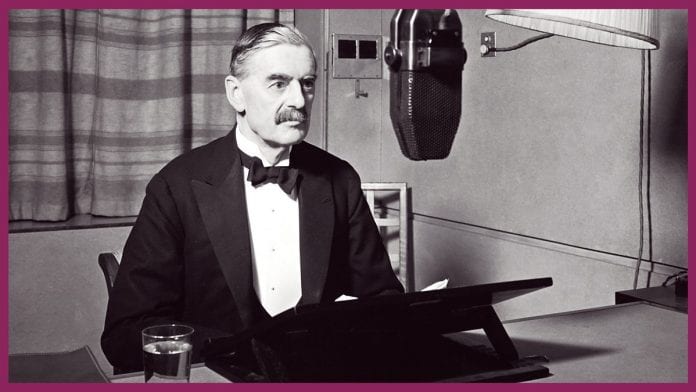- 3rd September marks 80 years since WWII began, yet less than half of the British public are able to identify the significance of the forthcoming anniversary
- 42% of Brits believe Winston Churchill was Prime Minister at the time, rather than Neville Chamberlain, and just four-in-ten could name King George VI as the reigning monarch
- Half the population say they have no knowledge of their family’s experience of the war
Today marks 80 years since the outbreak of World War II, when Neville Chamberlain delivered news of the declaration of war against Nazi Germany to the nation via a historic BBC radio broadcast, yet the nation’s knowledge of the war and how it was experienced by our ancestors is lacking.
New research shows fewer than half (47%) of the British public are able to correctly identify the date of the forthcoming anniversary, with a quarter (27%) admitting they ‘don’t know’ when then war started.
Of those questioned 5% believe war was declared on June 6, 1944, the date of the D Day landings and 4% chose May 8, 1945, which is VE Day when Germany surrendered.
The study of 2,000 British adults commissioned by Ancestry®, the global leader in family history and consumer genomics, revealed it’s not just the historical facts the nation is missing. Responses show almost half (49%) of Brits say they have no knowledge of what their family was doing or how they reacted to news of the outbreak of World War II, despite a third (34%) having a living relative who is old enough to remember the event.
Unsurprisingly, 58% of Brits wish they knew more about their family’s experience of WWII.
The research highlights that the nation’s understanding of this definitive moment in national history has become muddled over time, as two fifths of the British public (42%) believe Winston Churchill was the Prime Minister who declared war on Germany, with less than a third (29%) correctly answering Chamberlain.
In addition, only four-in-ten (43%) were able to correctly name King George VI as the reigning monarch at the outbreak of WWII – whilst one in 10 believe our present Queen Elizabeth II (11%) or Queen Victoria (9%), who died in 1901, was on the throne.
The research has highlighted the nation’s limited understanding of how significantly the Second World War impacted their family members. Operation Pied Piper, the biggest and most concentrated mass movement of people in Britain’s history, saw over a million mothers and children evacuated from cities in the first three weeks of September 1939. While over one-in-five people (22%) say they know of a close relative who was evacuated around this time, many more (33%) aren’t sure whether their relatives were among them.
The findings show just 17% were able to correctly identify the period of quiet on the Home Front until spring 1940 as The Phoney War. Others guessed The Blitz (20%), D Day (16%) and the Cold War (4%) – which in fact took place between 1945-1989 – or The Great Escape (3%), the popular war film about the famous POW escape from Colditz.
I addition, just 14% believe it was the Nazi invasion of France which prompted the declaration, rather than Poland.
Russell James, DNA and Family History expert at Ancestry®, commented: “Chamberlain’s broadcast was a historical moment experienced by the entire nation, as families gathered round radio sets in homes up and down the land. Those who still remember that moment are a living archive and we should make the most of them and the historical records available today to understand our family connection to these significant events.”
Anyone looking to discover more about their backstory including links to WWII can explore the 1939 England and Wales Register on ancestry.co.uk. Taken two weeks after the outbreak of WWII, the records provide a fascinating and insightful snapshot of the country at the time.
Help keep news FREE for our readers
Supporting your local community newspaper/online news outlet is crucial now more than ever. If you believe in independent journalism, then consider making a valuable contribution by making a one-time or monthly donation. We operate in rural areas where providing unbiased news can be challenging. Read More About Supporting The West Wales Chronicle

























